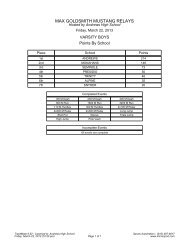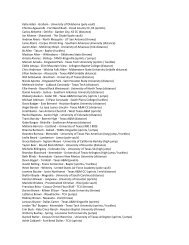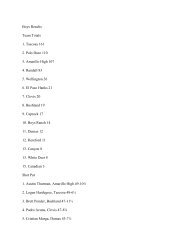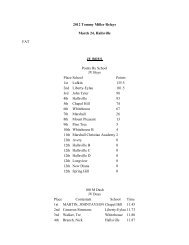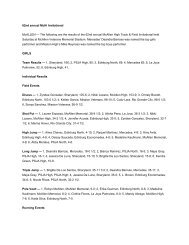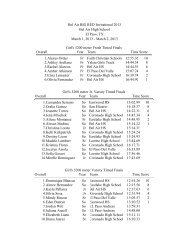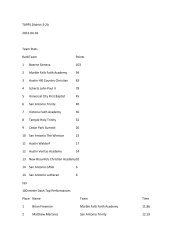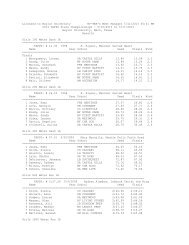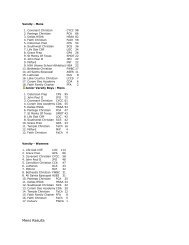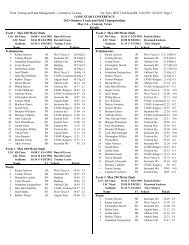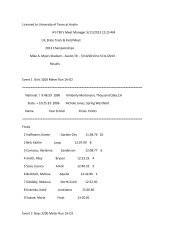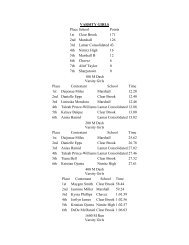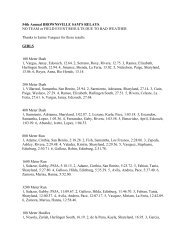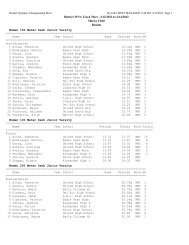1. PAGES 1-35 - Texas Track & Field Coaches Association
1. PAGES 1-35 - Texas Track & Field Coaches Association
1. PAGES 1-35 - Texas Track & Field Coaches Association
Create successful ePaper yourself
Turn your PDF publications into a flip-book with our unique Google optimized e-Paper software.
A MENTAL PLAN<br />
KIRBY LEE PHOTOGRAPH<br />
Hardy, J., Hall, C. R., & Hardy, L. (2005). Quantifying athlete<br />
self-talk. Journal of Sport Sciences, 23(9), 905-917.<br />
Hardy, J., Roberts, R., & Hardy, L. (2009). Awareness and<br />
motivation to change negative self-talk. The Sport Psychologist,<br />
23, 4<strong>35</strong>-450.<br />
Hatzigeorgiadis, A., & Biddle, S. (2008). Negative self-talk during<br />
sport performance: Relationships with pre-competition<br />
anxiety and goal performance discrepancies. Journal of Sport<br />
Behavior, 31(3), 237-253.<br />
Hatzigeorgiadis, A., Zourbanos, N., & Theodorakis, Y. (2007).<br />
The moderating effects of self-talk content on self-talk functions.<br />
Journal of Applied Sport Psychology, 19, 240-25<strong>1.</strong><br />
Holliday, B., Burton, D., Sun, G., Hammermeister, J., Naylor,<br />
S., & Freigang, D. (2008). Building the better mental training<br />
mousetrap: Is periodization a more systematic approach to<br />
promoting performance excellence? Journal of Applied Sport<br />
Psychology, 20, 199-219.<br />
Judge, L. W., Bell, R. J., Bellar, D., & Wanless, E. (2010).<br />
Developing a mental game plan: Mental periodization for<br />
achieving a “flow” state for the track and field athlete. The Sport<br />
Journal, 13(4), ISSN: 1543-9518.<br />
Ming, S., & Martin, G. L. (1996). Single-subject evaluation of a<br />
self-talk package for improving figure skating performance. The<br />
Sport Psychologist, 10, 227-238.<br />
St Clair Gibson, A., & Foster, C. (2007). The role of self-talk in<br />
the awareness of physiological state and physical performance.<br />
Sports Medicine, 37(12), 1029-1044.<br />
Ravizza, K. (1977). A subjective study of the athlete’s greatest<br />
moment in sport. In Proceedings of the Canadian Psychomotor<br />
Symposium, Psychomotor Learning and Sport Psychology<br />
Symposium (pp. 399-404). Toronto, Canada: Coaching<br />
<strong>Association</strong> of Canada.<br />
Reardon, J. (1992). Incorporating mental skills into workouts:<br />
Learning how to “go with the flow.” American Athletics, 3, 54-55.<br />
Reardon, J. (1995). Relaxation: A necessary skill for competition.<br />
American Athletics, 3, 50-53.<br />
Reardon, J., & Gordin, R. (1999). Psychological skill development<br />
leading to a peak performance “flow state.” <strong>Track</strong> and<br />
<strong>Field</strong> <strong>Coaches</strong> Review, 3(2), 22-25.<br />
Theodorakis, Y., Weinberg, R., Natsis, P., Douma, I., &<br />
Kazakas, P. (2000). The effects of motivational versus instructional<br />
self-talk on improving motor performance. The Sport<br />
Psychologist, 14, 253-272.<br />
Zinsser, N., Bunker L., & Williams, J. M. (2010). Cognitive<br />
techniques for building confidence and enhancing performance.<br />
In J. Williams (Ed.), Applied Sport Psychology: Personal<br />
Growth and Peak Performance (305-3<strong>35</strong>). New York City, NY:<br />
McGraw-Hill.<br />
34 techniques AUGUST 2011



